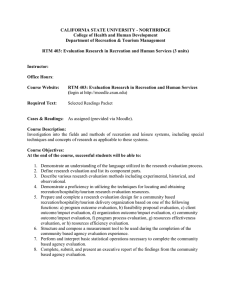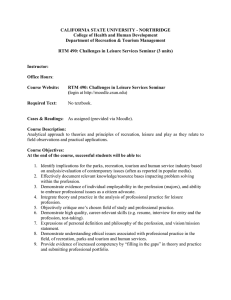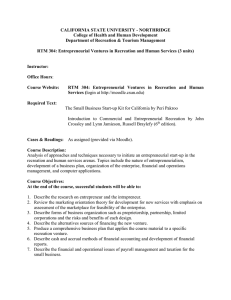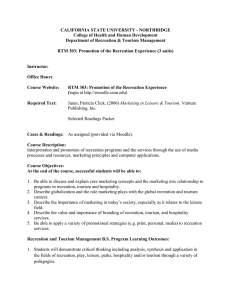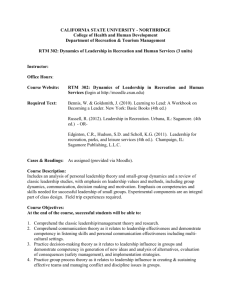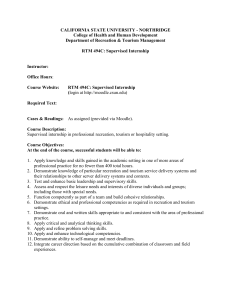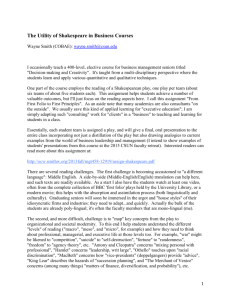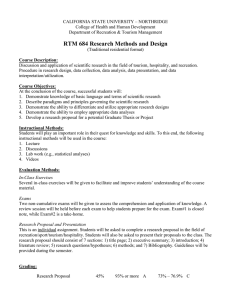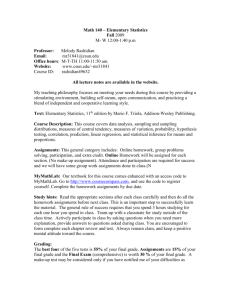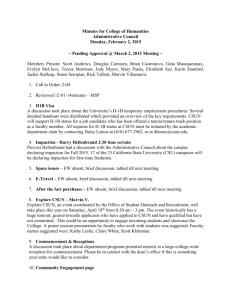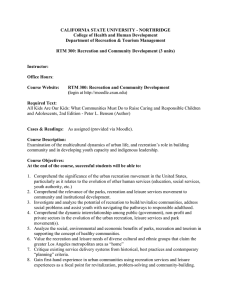RTM 402
advertisement
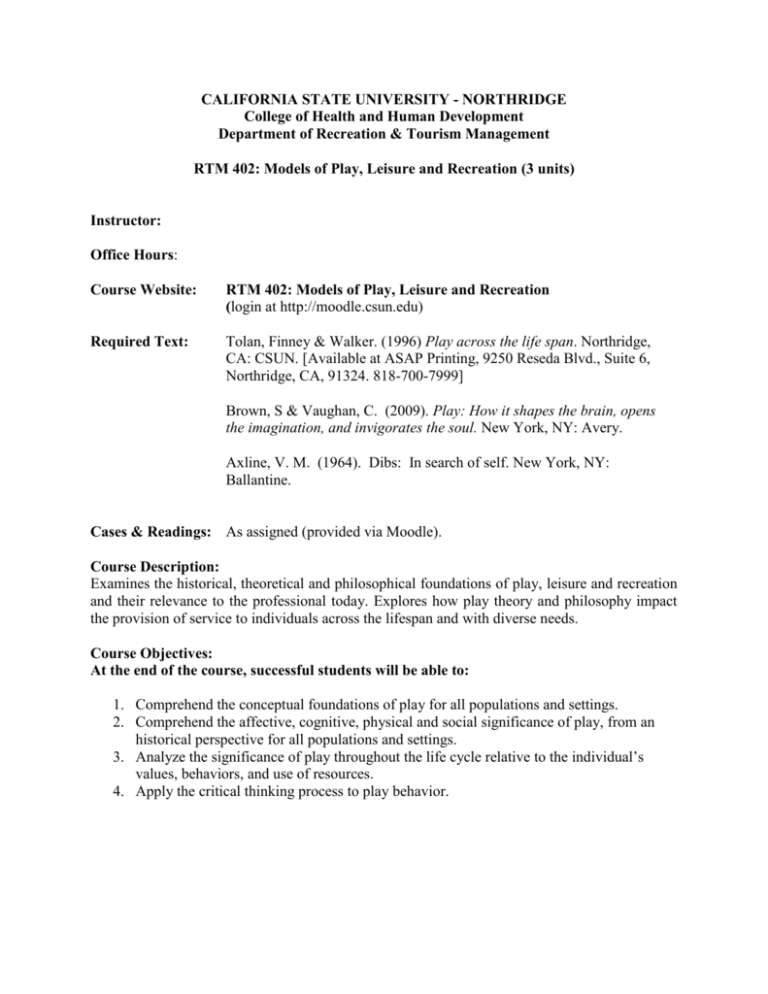
CALIFORNIA STATE UNIVERSITY - NORTHRIDGE College of Health and Human Development Department of Recreation & Tourism Management RTM 402: Models of Play, Leisure and Recreation (3 units) Instructor: Office Hours: Course Website: RTM 402: Models of Play, Leisure and Recreation (login at http://moodle.csun.edu) Required Text: Tolan, Finney & Walker. (1996) Play across the life span. Northridge, CA: CSUN. [Available at ASAP Printing, 9250 Reseda Blvd., Suite 6, Northridge, CA, 91324. 818-700-7999] Brown, S & Vaughan, C. (2009). Play: How it shapes the brain, opens the imagination, and invigorates the soul. New York, NY: Avery. Axline, V. M. (1964). Dibs: In search of self. New York, NY: Ballantine. Cases & Readings: As assigned (provided via Moodle). Course Description: Examines the historical, theoretical and philosophical foundations of play, leisure and recreation and their relevance to the professional today. Explores how play theory and philosophy impact the provision of service to individuals across the lifespan and with diverse needs. Course Objectives: At the end of the course, successful students will be able to: 1. Comprehend the conceptual foundations of play for all populations and settings. 2. Comprehend the affective, cognitive, physical and social significance of play, from an historical perspective for all populations and settings. 3. Analyze the significance of play throughout the life cycle relative to the individual’s values, behaviors, and use of resources. 4. Apply the critical thinking process to play behavior. Recreation and Tourism Management B.S. Program Learning Outcomes: 1. Students will demonstrate critical thinking including analysis, synthesis and application in the fields of recreation, play, leisure, parks, hospitality and/or tourism through a variety of pedagogies. 2. Students will practice and self-assess progress toward mastery of the standards and competencies of appropriate accrediting bodies through continual self-assessment and portfolio development. 3. Students will demonstrate application and integration of theoretical knowledge in a practical setting through a minimum of 400 hours of professional internship in preparation for pursuing employment. 4. Students will demonstrate an increase in Emotional Intelligence while pursuing their degree objectives. Course Requirements: This seminar oriented class is based on student participation & discussion, assigned readings, case studies, and other supplementary materials. To fully benefit from this class, students should keep up with the assigned readings and read additional materials (media, trade publications, journals) as much as possible. Class discussions facilitate the exchange and understanding of ideas and concepts. This will not be possible if students come to class unprepared. 1. Play Log (Individual Written Assignment)- 30 points Student will select a specific cohort and record in writing 15 detailed anecdotal observations of members of the cohort in play. Quality of assignment will be assessed by the depth of understanding demonstrated in the analysis. 2. Individual Author Concept Paper (Individual Writing Assignment and presentation and group presentation)– 30 points Each student will read a minimum of 1 book and/or 5 journal articles (2 of these may be on-line) which discuss the author’s work. A paper that provides a comprehensive analysis of the author’s model will be submitted. 3. Group Presentation– 20 points A group will present on application of major play theorist to a recreation, hospitality or tourism service/program. 4. Class Participation– 20 points Participation includes attendance (In the event it is necessary to miss a class, the student is responsible for the information discussed in class), reading assignment materials in a timely manner, actively participating in the class discussion and so on. Class time will be utilized to discuss a variety of play concepts and the readings in the two texts. The student is expected to have read the material and be ready to discuss it in class as well as respond in written class assignment. Evaluation: Play Log Concept Paper Group Presentation Class Participation Total 30% 30% 20% 20% 100% Grading A 90-100% B 80-89% C 70-79% D < 69% COURSE CALENDAR Date Discussion Topic Assignment Due Week 1 Introduction, Course Outline Review and Levy Read chapter 1 in Tolan et.al. Week 2 Play Log and Field Research Selection of Authors and Read chapter 3 in Tolan et.al. APA Week 3 Library Research Authors Week 4 Critical Thinking and Arnold Read chapter 2 in Tolan et.al. Week 5 Day to complete field research. No class. Read Dibs Week 6 Moore and field research findings Play Log Due Chapters 1 & 2 in Brown Week 7 Schools of Thought Discussion of Brown Chapters 3 & 4 in Brown Week 8 Behavior Domains Chapters 5 & 6 in Brown Discussion of Brown Week 9 Discussion of Brown Chapters 7 & 8 in Brown Week 10 Concepts Written Concept Paper Due Week 11 Day to prepare group presentations. No class. Week 12 Group Presentations Week 13 Group Presentations Week 14 Group Presentations Week 15 Final day to turn in any late work. No work will be accepted after 7 pm The extended course calendar will be available on MOODLE. The calendar will be modified on Moodle as the semester progresses. This syllabus is subject to change. It is the student’s responsibility to keep track of changes provided through Moodle. Course Policies and Guidelines: 1. Students’ participation is vital to successful learning. Therefore, students are expected to attend the class regularly, arrive on time, take notes, complete reading assignments on schedule, and actively participate in discussions and other learning activities. 2. In order to create a safe, welcoming, and productive learning environment, students are expected to respect each other, the facilities and equipment. Abusive, violent, disrespectful or disruptive behavior will not be tolerated. Students are referred to the policies and regulations section of the University Catalog for university policies and code of conduct information. 3. Cellular phones, pagers and other electronic devices not being used for instructional purposes should be kept off during class. 4. If you miss class, make arrangements with peers to collect class information, announcements and materials. Information will not be repeated for those who are tardy or absent. 5. Communication: Students are expected to have access to their CSUN email account. The instructor will send class announcement to students via students’ official CSUN emails. If you have a primary email that is not your CSUN account, please have your CSUN email forwarded to your primary email. 6. Late Assignment: Late assignments will be accepted with a penalty of 15% off per day. Assignments submitted more than three days late will not be accepted without prior arrangement with the instructor. No assignments will be accepted after the last official day of class. 7. Make-up Work: Make-up assignments or exams will be given only when students meet the following conditions: i. Absences caused by hospitalization, death in the family, or other emergencies must be documented within 48 hours of your return to class. Acceptable documentation includes a letter from a physician, a newspaper obituary, or a memorial service program. ii. Absences for official University activities (e.g., athletics, band, and chorus) must be documented and approved in advance. Please contact the instructor if you have any questions regarding your eligibility to make up for an assignment. 8. Academic Honesty: According to the University’s policy on academic honesty, no form of academic of dishonesty will be tolerated. Any student found cheating, plagiarizing a written assignment, or committing any other infraction against CSUN’s policy will either receive a failing grade for the course, be referred for University disciplinary action, or both. Please refer to www.csun.edu/a&r/soc/studentconduct.html for additional information. 9. Students are advised to consult with campus services to receive assistance if they have concerns regarding skills in areas such as writing or studying or computer skills. 10. Students are encouraged to be proactive and seek out the instructor as soon as they have any concerns about the class or their performance. The end of the semester is too late to take action to bring up a grade. 11. All assignments must be typed, double spaced, 12-point font, 1 inch margins and should follow the American Psychological Association (APA) style (6th ed.). 12. Microsoft Word is the ONLY acceptable document format for online or email submission. The following format should be used when naming the file: Course number_last name_first name_short title (for example: RTM550_xie_jimmy_syllabus). STUDENT RESOURCES Disability Resources and Educational Services (DRES). In keeping with the University’s policy, reasonable accommodation is provided for students with disabilities that might affect their course participation or assignment completion. Any student with disabilities should contact DRES at 818-677-2684 or dres@csun.edu. DRES is located in Bayramian Hall room 110 (BH 110). Please visit www.csun.edu/dres/index.php for additional information and/or assistance. The National Center on Deafness (NCOD) is located on Bertrand Street in Jeanne Chisholm Hall and can be reached at (818) 677-2611.You are not required to disclose your disability to me in order to receive accommodation during this course. Learning Resource Center (LRC) and Writing Center. The LRC is committed to helping students become better writers, critical thinkers, and communicators by providing face-to-face and electronic consultation, tutorials, reference manuals, and links to Web writing resources. As part of the LRC, the Writing Center staff is available to help students during the conception, research, drafting, or revision stages of a paper. Students may visit the Writing Center in Bayramian Hall room 408 (BH 408) or call 818-677-2033 to make an appointment. Walk-ins are available on a limited basis. For additional information and/or assistance, please visit www.csun.edu/lrc. University Counseling Services (UCS). Students sometimes experience significant confusion and distress when trying to manage school, work, relationships, and family responsibilities. UCS provides free and confidential consultations to help students deal with academic stress, relationship problems, family/roommate conflicts, personal growth, crisis events (e.g., rape, divorce, assault) and other mental health issues (e.g., anxiety, depression, suicidal ideation). Students may visit UCS in Bayramian Hall room 520 (BH 520) or call 818-677-2366 (V), 818677-7834 (TTY) for an appointment. UCS is located on the web at www.csun.edu/counseling.
